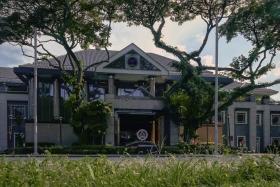PM Lee salutes early migrants and urges youth to follow their example
Mr Lee also encourages today's youth to follow their example in contributing to society
Singapore's early migrants are unsung heroes who contributed to the nation's extraordinary achievements, said Prime Minister Lee Hsien Loong, urging today's youth to uphold their work ethic and solidarity in contributing to the country.
PM Lee, speaking in Mandarin at a gala dinner yesterday marking the 100th anniversary of the Singapore Chin Kang Huay Kuan, noted that the first Chinese sailboat to arrive here was a junk from the city of Jinjiang in Fujian, China - where the clan association's members had originally hailed from.
That was in 1821, just two years after Sir Stamford Raffles landed in Singapore.
Subsequently, more Chinese sailboats arrived at the Singapore River from the Fujian and Guangdong provinces, carrying with them migrants who sunk roots in here.
"Many of the early migrants from Jinjiang worked at the Singapore River as coolies, taking on the laborious task of loading and unloading goods.
"They contributed significantly to Singapore's development as a thriving port today," said PM Lee, who was guest-of-honour at the dinner at the Raffles Convention Centre, attended by over 1,000 guests.
Noting that Singapore will be paying tribute to its pioneers when it marks its bicentennial next year, he called for members of Chin Kang Huay Kuan and other clans to be actively involved in commemorative events to help Singaporeans appreciate the contributions of the Chinese community.
For instance, members pooled money and resources to set up a clan house, and a school to help students whose education had been disrupted after World War II.
Today, despite changes over time, Chin Kang Huay Kuan, along with other Chinese community groups, continues to serve the people and contribute to society, PM Lee added.
For instance, as Singapore ages, the clan has often partnered community groups to organise activities for seniors.
It plays a role in Singapore's cultural and economic development by holding networking events with members of other Jinjiang clans from around the world, he said.
It also takes an inclusive approach by welcoming youth without connections to Jinjiang to take part in activities organised by the clan's youth group.
In the last two years, the clan has also opened its doors to the public for visits during the Singapore Heritage Festival.
Congratulating the clan on its centenary celebrations, PM Lee said: "I hope other clan associations can also adapt to the times like the Chin Kang Huay Kuan, particularly in terms of caring for the elderly and introducing the young to traditional culture."
Get The New Paper on your phone with the free TNP app. Download from the Apple App Store or Google Play Store now


